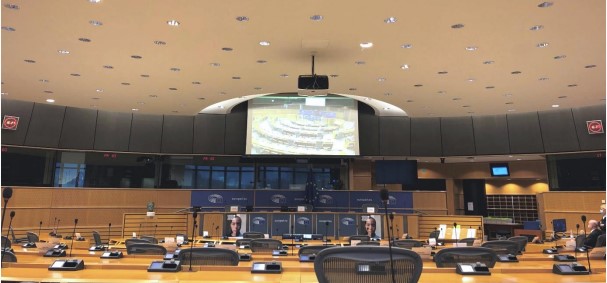by Gabrielle Bunton and Jule Ahles
Room 3G-3 in the European Parliament before the meeting started. The room remained mostly empty as some members of
the Subcommittee on Tax Matters and the Finance Committee of the Slovenian national Parliament joined via Videocall.
About two months before the EU directive implementing the OECD/G20 Inclusive Framework on a
global tax reform meets for the first time, members of the EU Subcommittee on Tax Matters met with
the Slovenian Presidency to exchange views on the OECD tax reform and discuss the introduction of
the EU digital levy. The unanimity with which the agreement was welcomed was striking.
As a reminder, the OECD tax deal provides for a minimum corporate tax rate of 15% and combats
profit shifting to tax havens. 136 countries have confirmed their participation, including all EU
countries.
The question now is not so much whether the agreement will be implemented, but how and on what
basis. Virtually all political groups agree on the success of such an agreement, but some want the EU’s
implementation to go beyond the official agreement.
The European Green Party, represented by Mikuláš Peksa, proposed that the agreement should also be
implemented for companies that are below the €750 billion annual turnover threshold. “The minimum
should be a starting point, not a target,” Peksa said. The Progressive Alliance of Socialists and
Democrats (S&D) group also welcomes a higher tax rate than 15%, confirmed Niels Fuglsang.
Boyer Gilles, a member of the Renew Europe group, adds that the ultimate goal of the EU should be a
harmonised tax base, which is why the minimum tax should be set higher. At the same time, he prefers
“to have an agreement at all, that is the first step”.
It is rather unlikely that the implementation will really go beyond what has now been agreed, as the
parliament needs unanimity and low-tax countries like Ireland will refuse to agree to a higher rate.
Insiders even say that there is no chance that there will be more than what has now been agreed.
Still open is the question of how to deal with digital tax levies, which some member countries such as
France, Italy and Spain have introduced themselves. The original idea of a European tax on digital
services was not implemented EU-wide but served as a template for some member states to introduce
such a tax.
Now the U.S. has made its agreement to the OECD agreement conditional on the EU digital levy
being abolished. Paul Tang, head of the Subcommittee on Tax Matters, stressed that there was no way
around its abolition and that alternatives had to be sought to increase the EU’s resources.
The original idea behind the EU digital levy was to plug the holes that the Covid-19 pandemic tore in
the budgets of the member states.







